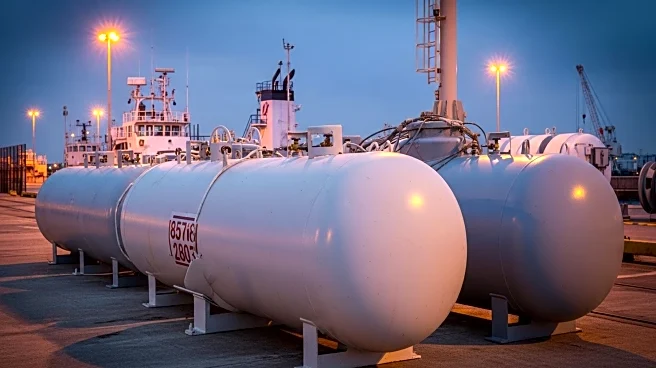What is the story about?
What's Happening?
U.S. ports are increasingly turning to propane as a reliable and cost-effective power solution in response to grid instability and rising energy costs. Propane provides on-site, scalable power, enabling ports to maintain operations without the need for expensive infrastructure upgrades. A recent webinar highlighted how one U.S. port achieved over $1 million in savings by utilizing propane. The discussion emphasized propane's ability to ensure uptime during grid disruptions and its deployment in yard tractors and gensets. Industry experts, including John Barnett from Suburban Propane and Jim Bunsey from the Propane Education & Research Council, underscored propane's advantages in delivering immediate power and cost savings.
Why It's Important?
The adoption of propane as a power solution for ports addresses critical challenges related to energy reliability and cost management. As ports face grid instability, propane offers a practical alternative that ensures continuous operations and reduces dependency on traditional energy sources. The cost savings achieved through propane utilization can significantly impact port operations, enhancing competitiveness and financial stability. Propane's scalability and ease of deployment make it an attractive option for ports seeking to modernize their energy infrastructure. The shift towards propane reflects broader trends in energy diversification and resilience, supporting sustainable and efficient port operations.
What's Next?
As ports continue to explore propane as a power solution, further investments in infrastructure and technology are anticipated. The development of propane-powered equipment and systems will likely expand, offering ports greater flexibility and efficiency. Industry stakeholders may collaborate to enhance propane supply chains and distribution networks, ensuring reliable access to this energy source. Regulatory bodies may introduce incentives and policies to support the adoption of propane and other alternative fuels. The ongoing transition towards propane and other sustainable energy solutions will drive innovation and foster partnerships aimed at achieving energy resilience and sustainability in port operations.
Beyond the Headlines
The use of propane in port operations highlights broader themes of energy transition and resilience. As ports seek to mitigate the impacts of grid instability, propane offers a viable solution that aligns with sustainability goals. The shift towards alternative fuels reflects the industry's commitment to reducing carbon emissions and enhancing energy efficiency. The adoption of propane underscores the importance of diversification in energy sources, supporting the transition to a low-carbon economy. The collaboration between industry leaders and regulatory bodies will be crucial in driving progress and ensuring the long-term success of sustainable port operations.















